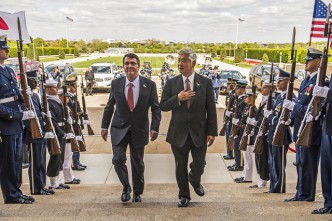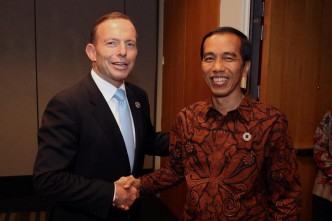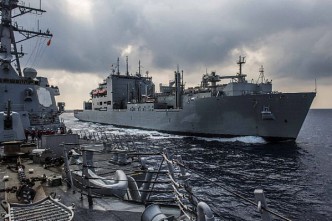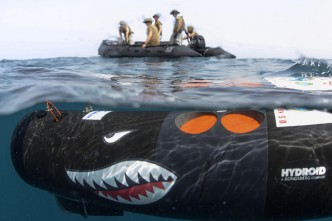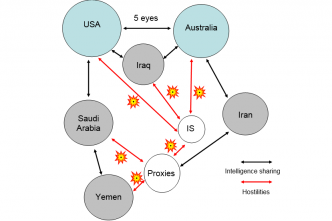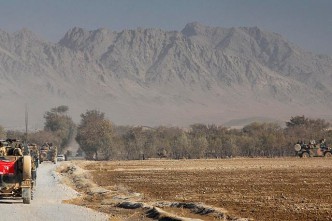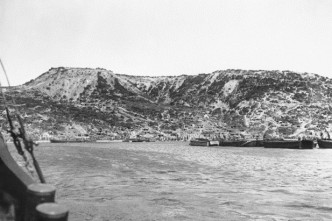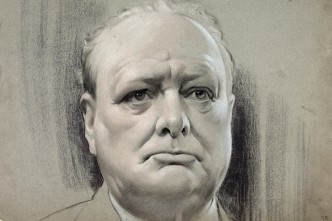The Beat Financial Action Task Force report The latest report of the Financial Action Task Force on Australia’s compliance with anti-money laundering measures rated our legislation, systems and financial intelligence highly. The report, out every five …
It appears that, in the end, nothing could have saved Andrew Chan and Myuran Sukumaran—and, incidentally, six other drug convicts—who were executed by firing squad on the Indonesian prison island of Nusakambangan early yesterday morning. …
The new US–Japan Guidelines for Defense Cooperation (PDF) and the accompanying joint statement by the two countries’ foreign and defence ministers commit both sides to do more with each other in relation to third countries …
Following the executions of Andrew Chan and Myuran Sukumaran last night, it doesn’t pay to let hurt or anger drive one’s thinking about Australia–Indonesia ties. Those who care about the relationship—mostly politicians and officials, not …
In a remarkable public speech at ASPI’s Future Surface Fleet conference last month, the Commander of the US Pacific Fleet—Admiral Harry B. Harris—criticised China for engaging in an ‘unprecedented land reclamation’ effort, creating a ‘great …
We recently discussed the impact of organised crime on Australians’ daily activities and on Australia’s national interests. But organised crime also has the potential to adversely affect Australia’s financial interests too. With the mining boom …
The executions of Andrew Chan and Myuran Sukumaran will leave most Australians dismayed by President Joko Widodo’s refusal of clemency, angered by the clumsy, ugly execution process and jaundiced by the attitudes of a number …
Across much of the globe, the First World War—‘the war to end all wars’—still exercises a fierce hold on popular imagination. And many aspects of the war remain a subject of debate, more so than …
Sea State Earlier this week, tensions between the US and Iran in the Gulf of Aden eased when Iranian vessels suspected of carrying arms for the Houthi rebels in Yemen began a slow retreat towards …
In his latest book Henry Kissinger anticipated China’s initiative to create the first new international organisation of the 21st century. He didn’t foresee the Asian Infrastructure Investment Bank (AIIB) as such, but argued that as …
The news that Australia has done a deal to exchange intelligence with Iran generated some fierce criticism from independent MP Andrew Wilkie, who described the arrangement as ‘complete and utter madness from a security point of …
Thanks to Andrew Kwon for his reflections on the piece Natalie Sambhi and I wrote recently, in which we considered the future of America’s Asia–Pacific rebalance should Hillary Rodham Clinton make it to the White …
The Army has shouldered the bulk of the Australian Defence Force’s operational workload and casualties over the last decade or so. While there has been a range of equipment acquisitions which has left Army far …
Malcolm Fraser’s greatest contribution to foreign policy was the new consensus on Asia that he embraced, fostered and cemented. Fraser’s Asia policy drew large elements of continuity from the Whitlam government that Fraser blasted from …
‘Tell the colonel the damn fools have landed us a mile too far north,’ yelled Royal Navy commander, Charles Dix, at dawn on 25 April 1915, as the first Australian troops jumped ashore at Anzac …
For all your international security and defence reading, look no further than ASPI Suggests! Tomorrow’s ANZAC Day (25 April) will mark the 100th anniversary of the first major military action fought at Gallipoli by Australian and New …
The First Principles Review of Defence called for abolition of the Capability Development Group (CDG) and Defence Materiel Organisation (DMO). The review recommended a new oversight structure for Defence capital equipment procurement and sustainment, but …
The strategic origins of the Gallipoli operation are to be found in the determination of the First Lord of the Admiralty, Winston Churchill, to use the navy decisively to influence the war on land, in …
Andrew Davies: It’s been a few weeks since the release of the First Principles Review into Defence. Yesterday ASPI released its ‘review of the Review’, and it’s now time to think about what comes next—implementation …
Confronted with the First Principles Review’s 70 recommendations, it’s easy to lose sight of the forest for the trees. Viewed from arm’s length, the two most important outcomes aren’t actual recommendations but the decisions—one explicit, …




